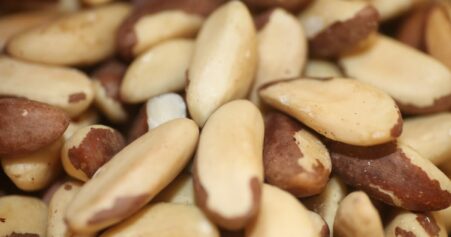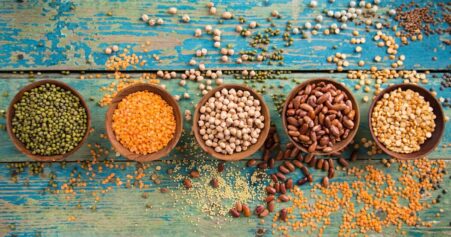Table of Contents
Vegan choline sources are rare, but there are some. Learn which plant foods contain choline, and what the scientific literature says about requirements and status.
Choline has received little attention in the past, but has recently received increased attention. Vegan diets in particular have been criticized for being deficient. How true are these claims? Are vegans deficient, and what would be the consequences?
Choline
Functions
Choline is a methyl group donor, and is therefore important (in combination with other nutrients) for intermediary metabolism and for the activation and deactivation of various genes. This may also play a role in the development of disease. The micronutrient is important in the body for the structure and function of membranes, and it is involved in neuronal development, cell signaling, stimulus transmission, and lipid transport and metabolism.
Although small amounts are produced endogenously in the liver, this is probably not enough to meet the body’s needs. Therefore, choline must be obtained from the diet.
In addition, it is important to note that folic acid and vitamin B12 must be present in sufficient amounts for choline to be synthesized in the body (Wallace and Fulgoni, 2017). Since vegans typically have adequate folic acid intake, this condition should usually be present when vitamin B12 is supplemented.
Consequences of Deficiency
If choline is not consumed in sufficient amounts, there may be adverse health consequences. These include, but are not limited to
- fatty liver disease (non-alcoholic fatty liver disease, NAFLD);
- liver and muscle damage;
- impaired organ function; and
- increased risk of cancer.
However, the studies that show a deficiency do not allow conclusions to be drawn about the intake level at which this occurs. In addition, the need, and thus the risk of these diseases appears to depend on other factors, such as genetic polymorphisms and the gut microbiome (NDA, 2016).
Intake Recommendations
The actual requirement for choline is not yet known. Therefore, most nutritional societies have not published reference values or recommendations.
In 2016, the EFSA Panel on Dietetic Products, Nutrition and Allergies (NDA) concluded in a statement that there is no evidence of a relationship between biomarkers of plasma concentration and dietary intake. Therefore, the Panel does not publish reference values for recommendations, but only derives Adequate Intake (AI) values. These are based on studies that determine the average intake of healthy individuals in the EU, as well as a study in which deficiency symptoms were corrected in the presence of deficiency-related organ disorders.
The U.S. Institute of Medicine (IOM) also published AI values in 1998, but these were based solely on data from a study to prevent liver injury and an intervention study in three women who were fed parenterally. The EFSA and IOM AI values are shown in Table 1.
Table 1: AI values for choline intake from NDA (2016) and IOM (1998)
| Population Group | EFSA (in mg/d) | IOM (in mg/d) |
| infants
0-6 months 7-11 months |
160 |
125 150 |
| children
1-3 years 4-6 years or 4-8 years 7-10 years 11-14 years or 9-13 years |
140 170 215 340 |
200 250 – 375 |
| adults
15-17 years or. 14-18 years ≥ 19 years |
400 400 |
m: 550; w: 400 m: 550; w: 425 |
| pregnancy | 480 | 450 |
| lactatation | 520 | 550 |
As you can see, the present data are rather poor, and the studies on which the AIs are based are of little significance. Therefore, the values are based on assumptions and deductions. Thus, the actual requirement could be lower because the average intake may be unnecessarily high. In addition, the requirement is also influenced by individual factors, including age, gender and genetics. As you can see in the table, the requirement increases during pregnancy and lactation. This is because choline is passed to the baby through the placenta during pregnancy and through the breast milk during lactation. An adequate supply is therefore essential for the healthy development of the child, to avoid neural tube defects and to prevent deficiency in the mother. Unfortunately, again, it is not clear what amounts constitute an “adequate supply”.
Oversupply
An upper intake level was established by the IOM in 1998. However, this was based on only one small study of seven Alzheimer’s patients. Therefore, its validity is rather low. From this, the Institute derived a Lowest Observed Adverse Effect Level (the lowest level at which adverse effects were observed) of 7.5 g per day. The effects of this high dose were low blood pressure, nausea, and diarrhea. Incorporating a safety factor, the IOM set the upper limit of safe intake at 3.5 g per day for adults.
In addition to the effects of overdosing mentioned above, there is evidence of an increased risk of coronary heart disease when very high amounts are ingested that exceed the intestinal absorption capacity. Thus, an unnecessarily high intake, like a deficiency, can have negative consequences (NDA, 2016).
Occurrence and Vegan Choline Sources
Choline is mainly found in products of animal origin such as liver, eggs, beef, fish and pork. As a result, vegans are likely to consume lower amounts of choline and are at increased risk for inadequate intake. However, vegan choline sources include broccoli and beans, shiitake mushrooms, wheat bran, Brussels sprouts, and almonds. However, the exact amounts are often unknown, especially outside of America (Wiedemann et al., 2018). It is also found in the emulsifier lecithin. Moreover, preparation affects the composition of choline compounds. However, it is unclear whether this plays a role in human nutrition adequate intake (Wallace and Fulgoni, 2017).
Nutritional Status
In EU-wide surveys between the years 2000 and 2011, the average intake of choline ranged from 269 to 468 mg per day. However, it is difficult to establish exact values. This is because, firstly, accurate data on the choline content of foods are not available at EU level and the values used are based on the United States Department of Agriculture (USDA) database (NDA, 2016; Bragg et al., 2022). Therefore, good vegan choline sources and their choline contents are difficult to determine. In addition, the validity of dietary surveys is limited because of several sources of error (for example recall, quantity estimation, social desirability).
Recent surveys in the U.S. indicate that only about 8 % of adults consume amounts equivalent to AI. Choline intake was particularly low in people who did not eat eggs and animal protein. The average intake was 257 mg/d (152-386 mg/d) for people aged 19 to 30 years. However, the calculations are based on so-called 24-hour recalls: respondents report what they ate in the previous 24 hours (Wallace and Fulgoni, 2017). First, this day may not reflect a typical diet; second, recall may be poor; and third, quantities may be highly imprecise. Nevertheless, intakes appear to be within a relatively wide range and, in some cases, low compared to AI.
According to one study, pregnant women surveyed in Germany consumed choline below the AI. The intake of vegetarian pregnant women was significantly lower than that of omnivores (Roeren and Smollich, 2022).
Conclusion
Choline is an important nutrient that has received (too) little attention. However, the research situation is currently insufficient to determine an exact requirement. Unfortunately, the existing recommendations are based on few studies that do not allow for meaningful conclusions and are rather conjectural. It is therefore premature to conclude that intakes below the AI will lead to a dangerous nutritional situation with serious negative consequences.
What is certain is that plant foods have a lower choline content than foods of animal origin. Therefore, it may be more difficult to meet choline requirements with a vegan diet. However, with a whole-food vegan diet that regularly includes choline-rich foods, it is probably possible to meet one’s needs.
Our recommendation: Make sure to include vegan choline sources on a regular basis. They are also rich in many other nutrients and are generally a recommended part of a vegan diet. You should also keep an eye on your folate and vitamin B12 intake. This is even more important during pregnancy.
If you are unsure whether you are getting enough choline, you can consult a (Vegan) Nutritionist and/or doctor. Together, you can consider supplementation if needed. This can be in the form of soy lecithin, which contains phosphatidylcholine, or citicoline. The latter is a readily available compound of choline and cytidine.









Leave a Reply